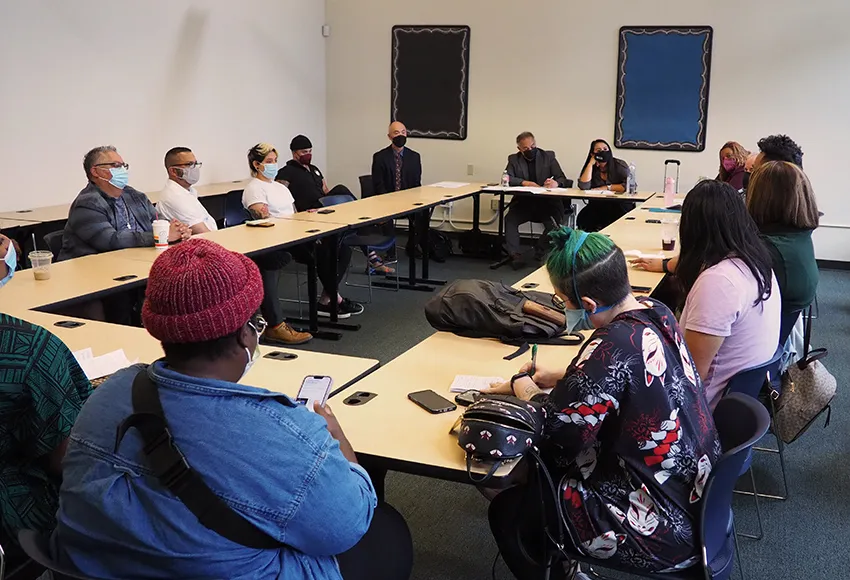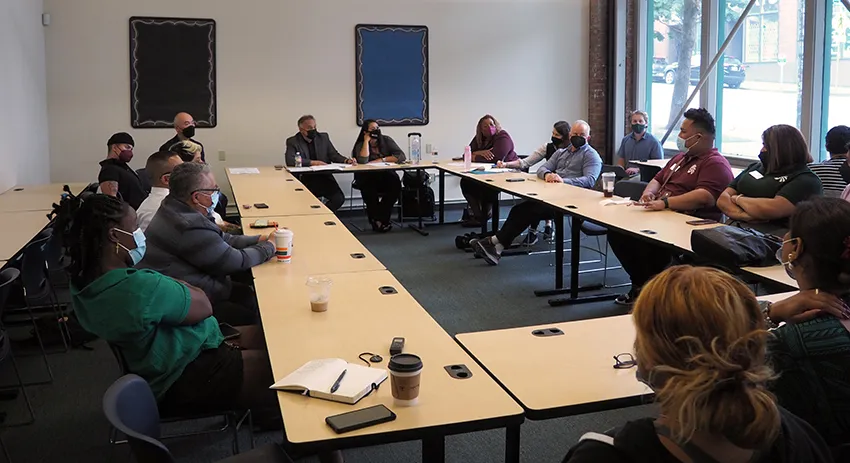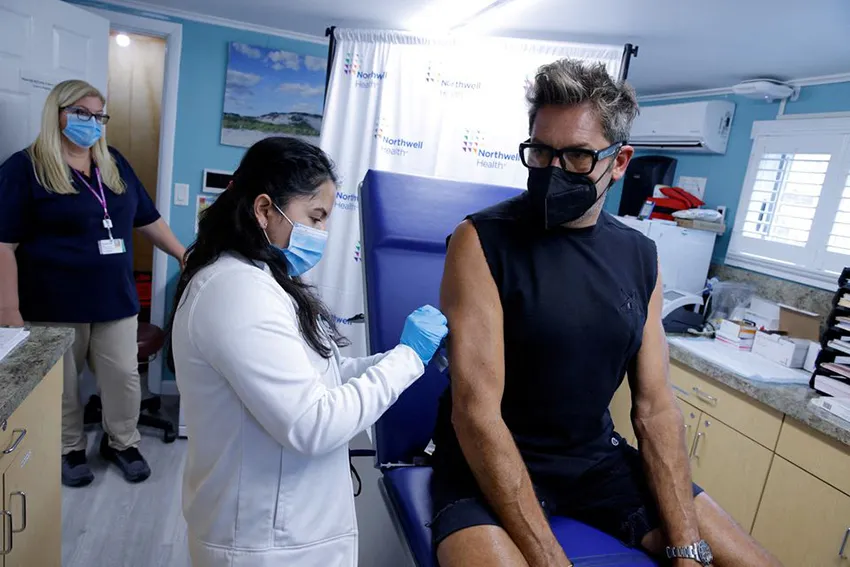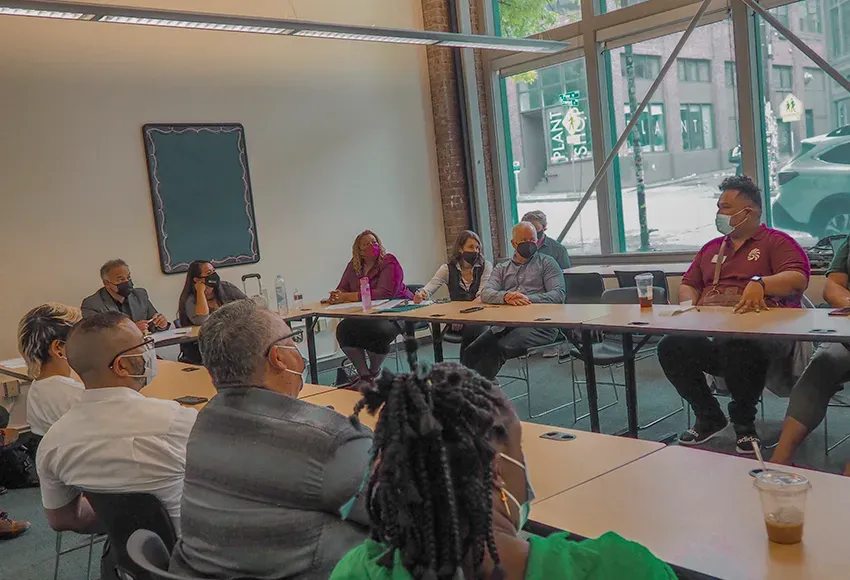Representatives of Seattle's LGBTQ+ community met with state government officials at the LGBTQ Center on Wednesday, August 3, to address growing concerns about the monkeypox virus (MPV) and the harmful misinformation being spread about its transmission nationwide.
"Today was an opportunity to bring people together, and also to hear and listen to conversations and concerns that are in multiple communities," Washington's secretary of health, Dr. Umair Shah, told the SGN.
"Anyone can get MPV," said the Washington Department of Health's director of community relations and equity, Naisha Williams, "regardless of gender or sexual identity."
At press time, over 6,000 cases of MPV have been reported in the United States, which has declared a public health emergency.
According to the state's DOH, 144 of Washington's 166 reported cases were in King County, and the majority of people who tested positive in King County live in central Seattle.
While men who have sex with men have been the primary focus of outreach and the largest group of people affected, MPV is not a technically sexually transmitted disease. as it can be spread to anyone (of any gender or sexual orientation) through close and prolonged skin-to-skin contact. This includes cuddling, and kissing, hugging, and even contact with clothing and bedding.

Stigma and equity
"This has been a very difficult time for all of us, and I want to say that the LGBTQ+ community has been really challenged, because there has been a lot of stigmatizing and a lot of real concerns that are both founded and related to perception," said Dr. Shah, addressing those assembled at the LGBTQ Center.
In attendance were representatives from Seattle's LGBTQ Center, Entre Hermanos, Taking B(l)ack Pride, Swedish Medical, UTOPIA Washington, the Trans Women of Color Solidarity Network, and the Washington State LGBTQ Commission, as well as members of the state DOH and the Region 10 director of the federal Department of Health and Human Services, Ingrid Ulrey.
Martha Zuniga, Entre Hermanos' deputy director, was first of the community leaders to speak. "My concerns are about the equity of resources available for people of color. My community – the Latinx community – has, I think, 33% of the cases already."
This statistic holds true in San Francisco – where MPV has affected only 15% of the population, but 30% of those infected are members of the Latinx community – but currently does not reflect Seattle's data.
"Another concern for me is the stigma and the way the information has been handled," said Zuniga.
Stigmatization of the LGBTQ+ community was a major concern of attendees, many of whom pointed to the government's mishandling of HIV in the 1980s, the ramifications of which are still felt today.
"I totally agree," said Dr. Tao Kwan-Gett, chief science officer of the state DOH. "One of the worse things we can do is to propagate stigma... Clearly, the outbreak is not under control, and the worst thing we can do is to make people embarrassed to talk about MPV, to not seek healthcare... We're very conscious that we can't repeat some of the mistakes made at the beginning of the HIV/AIDS pandemic."
"We want to be very clear that we are allocating vaccine resources for folks who are disproportionately affected, especially for communities of color," said Williams.
"I want to emphasize here, is that this disease, MPV, is a human disease. It's not a Gay disease," said Diana Krishna, community care program coordinator at UTOPIA Washington. "And what we are hearing from health organizations and health agencies [is that] they're sending us messages that this is a Gay disease, specifically focusing on gender-diverse folks."
Ulrey, the first openly Gay person appointed to her position, told the SGN in an email that the issue is "near and dear" to her. "Aggressively responding to the monkeypox outbreak is a critical priority for HHS, and we have launched a rapid and comprehensive response, significantly increasing vaccine supply and distribution, expanding access to tests, making treatments available for free, and educating the public on steps to reduce the risk of infection."

Community solutions
Many members of the assembly offered potential solutions and recommended courses of action that worked before. J. Manny Santiago, executive director of the Washington State LGBTQ Commission, suggested hosting community panels, citing their effectiveness during the height of the COVID pandemic.
"We can record [panels] with your questions, with your concerns, with your particular communities in mind, so we can address that, and have that as a tool available for everybody to use," said Santiago. "The Department of Health is huge. It deals with all health, and we can be a little more intentional – more focused – when it comes to our communities."
Mattie Mooney, co-founder of Taking B(l)ack Pride and senior coordinator of Transgender health at Swedish Medical, said the messaging should focus on transmission through skin-to-skin contact instead of sex. "What are all the ways you can have close contact with folks?" they reminded the assembly. "What are all the ways you can come in contact with open sores? That's what we need to be talking about, rather than having this hyperfocus on sex, [implying] we're all just having orgies in the street."
Whatever the message, translating it to be fully accessible by non-English speakers is crucial, said UTOPIA Washington's community care program manager, Falia Sipili. "There's a lot of nonprofits that work with a lot of marginalized communities, and what really counts as misinformation in the past year was the lack of translated material."

The takeaway
This meeting was the first step in community-organized activism against MPV. Solutions are still in the works for properly disseminating information and destigmatizing discussion around the virus, but the message going forward is clear.
"We cannot allow hMPXV [monkeypox, MPV] to become yet another opportunity for shame, stigma, and discrimination against LGBTQ+ communities," Bekah Telew, co-executive director of Seattle's LGBTQ Center said in a statement to the SGN. "This meeting demonstrated that the secretary of health and our public health officials are prioritizing the opportunity to be responsive to and learn about the needs and concerns of LGBTQ+ communities as it responds to the hMPXV outbreak.
"LGBTQ+ communities are strongest when we work together, and we hope that this meeting results in centering the needs of those in our communities who are most disproportionately impacted by hMPXV and who also experience the most barriers to health equity."
"I know that we are all tired because of COVID-19," Dr. Shah told the SGN. "I also know that, in public health, our work is never done. Whether it's day, night, weekends, or holidays, we're always recognizing that the next challenge is lurking behind the next corner. MPV shows us that that corner is already here... Everything we've learned from COVID-19 should help us, not hinder us, in being able to respond to another emerging virus."
This story is still developing. As more information about MPV comes out, information about prevention, affected communities, and vaccine availability may change. For up-to-date information, visit https://www.doh.wa.gov/you-and-your-family/illness-and-disease-z/monkeypox/.


